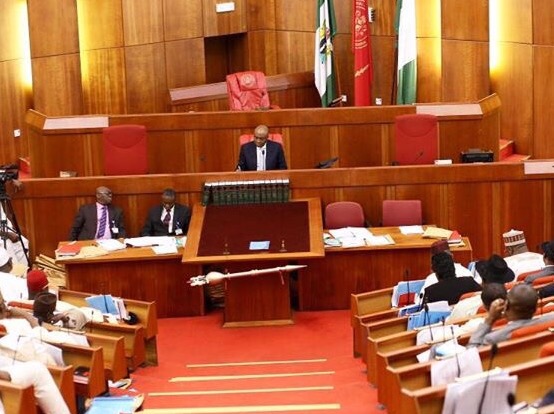By Ehichioya Ezomon
The horror of man’s inhumanity to man was starkly on display in Makurdi, the capital city of Benue State, on Thursday, when an unboarded trailer drove into the IBB Square, bearing 12 coffins of the “remains” of victims of attacks by “herdsmen” on January 1 and 2.
Several mini buses brought in additional 61 caskets of the 73 people killed for mass internment, witnessed by wailing family members, friends, government officials, traditional institutions, the Christian Association of Nigeria, a representative of the United Nations, and the general public that might include some of the culprits.
It was a spectacle not even dreamt of in an obviously annahilative proxy war, with 47 episodic attacks, according to the Tor Tiv, Prof. James Ayatse, visited on innocent and defenseless peasant farmers in the Middle Belt and other parts of Nigeria, by so-called herdsmen, who brandish AK47 riffles in place of sticks traditionally associated with cattle herders down the ages.
At the solemn and sombre rites, the Mourner-in-Chief, Governor Samuel Ortom, had a message for the purveyors of the massacres: “If the herdsmen think that the killing of our people will make us to stop the enforcement of the law, they have failed. We will not be deterred because I am ready to pay the supreme price for the implementation of the anti-open grazing law. I will continue to insist on the arrest of the factional leader of Miyetti Allah Kautal Houre.”
Recall that the Miyetti Allah Kautal Houre of the umbrella body, Miyetti Cattle Breeders Association of Nigeria, “confessed” that the Benue attacks were reprisals for alleged stealing of 1,000 of their herds by “some people?” What disrespect: Human lives for “stolen” cattle!
Ortom honed his defiance the previous day at a meeting with the Inspector General of Police, Mr. Ibrahim Idris. Reflecting the sentiments of the Benue people, the governor cautioned: “I must state that Nigeria is passing through serious security challenges. I pray we don’t get to the level that our people resort to self-defence, because, when people are not sanctioned for their lawlessness, anarchy and confusion would set in and nobody will be safe.”
But admitting that anarchy has already bestrode the land, the Chairman of the Northern Elders’ Forum, Wantaregh Paul Unongo, gave the Federal Government a two-week ultimatum to stop or arrest those behind the killings or “we shall raise an army of our own.”
“I am telling Nigerians that my people cannot continue to be cannon fodder for this country,” Chief Unogo said. “If the government can’t protect us, we will mobilize and train our people into an army to defend us… I am the spiritual and ancestral leader of the Tiv nation; enough is enough.”
Equally craving for government’s decisive action against the killings he described as “genocidal conspiracy,” and spoiling for self-mobilization to defend his people was former Military Governor of Plateau and Katsina States, retired Maj.-Gen. Lawrence Onoja.
Walking down memory lane, Gen. Onoja said: “Some of us, in 1966 (1967), fought the Nigerian civil war. Benue has contributed to the unity of this country. If the Federal Governmrnt refuses to address the killings in Benue, and if we decide to raise our army, as advocated by our elders, to defend ourselves, l will not mind to command that army despite my age.”
Exasperating, heartbreaking, heartrending! These are patriotic, elder statesmen, who should be living a blissful life, but here they are still carrying the mantle of defending their people against rampaging “herdsmen” that sow blood and sorrow everywhere, using their cattle as baits.
Enough has been said, but not done about these mindless killings. Yet, while the murdering, raping and destruction of homes and farmlands almost always appear one-sided, from the perspective of Inspector General Idris, they result from “communal crisis.” He has since recanted and apologized for that insensitive categorization.
The herdsmen’s activities have no links to “communal crisis” compelling police operations. They are programmed for certain ends, which could inadvertently threaten the security and corporate existence of the nation.
For once, the government must come clean about this issue, which has become an albatross on the necks of President Buhari and the All Progressives Congress administration he heads. Why is it difficult to mandate the Military to take charge, and label the armed “herdsmen” as terrorists the way Boko Haram was named, and unarmed Indigenous People of Biafra (IPOB) was proscribed and pigeonholed?
Why would the president, despite spirited denials, allow the festering of the notion, perception and direct allegation of using the herdsmen as foot solders for a so-called plan to Islamize Nigeria? Doesn’t this discernment bother him, as it worries even his most ardent supporters of other faiths?
With a patriotic fervour, Buhari should juxtapose his stance on the herdsmen issue with his famous inaugural proclamation to keep his oath and serve as President to all Nigerians because, “I belong to no nobody and I belong to everybody.”
The time to act is now, and with the bare knuckles, not kid gloves, that demands immediate deployment of military troops to the troubled spots, so that the “Pythons can dance” and the “Crocodiles can smile” to the perpetrators of the heinous crimes against Nigerians. That’s the only way to disprove the president’s perceived “body language” towards the herdsmen’s notoriety, and to pacify a harrowed, traumatized and beleaguered citizenry!
Mr. Ezomon, Journalist and Media Consultant, writes from Lagos, Nigeria.
